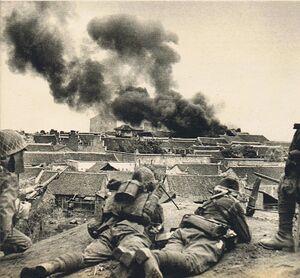Quenminese Front: Difference between revisions
BattlerNonna (talk | contribs) mNo edit summary |
BattlerNonna (talk | contribs) mNo edit summary |
||
| Line 39: | Line 39: | ||
* {{flagicon image|EmpireOfQuenminFlag.jpg|border|22px}} [[Thảo Cường]] | * {{flagicon image|EmpireOfQuenminFlag.jpg|border|22px}} [[Thảo Cường]] | ||
* {{flagicon image|EmpireOfQuenminFlag.jpg|border|22px}} [[Lạc Mỹ]] <!-- Female general ---> | * {{flagicon image|EmpireOfQuenminFlag.jpg|border|22px}} [[Lạc Mỹ]] <!-- Female general ---> | ||
* {{flagicon image|EmpireofQuenminFlag.jpg|border|22px}} [[Trần Thành Sang]] <!-- Grand Admiral and Chief of the Imperial Quenminese Navy General Staff --> | |||
* {{flagicon image|EmpireofQuenminFlag.jpg|border|22px}} [[Huỳnh Trọng Khánh]] <!-- Rear Admiral of the Trans-Bara Sea Long Range Task Force ---> | |||
* {{flagicon image|CacertianEmpireFlag.png|border|22px}} '''[[Rosalia Sarissita]]''' | * {{flagicon image|CacertianEmpireFlag.png|border|22px}} '''[[Rosalia Sarissita]]''' | ||
* {{flagicon image|CacertianEmpireFlag.png|border|22px}} '''[[Filomena Marcello]]''' | * {{flagicon image|CacertianEmpireFlag.png|border|22px}} '''[[Filomena Marcello]]''' | ||
Revision as of 03:19, 18 November 2021
The Quenminese Front was a theater of conflict between the Inner Sphere and the Common Axis during the Siduri War, pitting the Republic of Syara and Fascist Allamunnika against Quenmin, Cacerta, and Ruvelkan forces in exile. The conflict ocurred largely within Quenmin and along the Quenminese-Allamunnic border. The military theater is recognized with numerous names: among Syaran histographers, it is known as the Eastern Front; among contemporary Quenminese historians, it is recognized the Quenminese Theater, the Great Eastern War or the War of the Inner Sphere; among the Quocvangist propagandists, it was deemed the Liberation War for the Imperial Motherland; and among general historians, it is known as the the Eastern Siduri Theater.
The Quenminese Front began in October 1934 when the Army of the Syaran Republic and the Allamunnic Army launched a joint invasion of Quenmin, overrunning the Quenminese border and armed forces. The Inner Sphere advance was halted during the winter, and Quenminese forces were thereafter bolstered with thousands of fresh conscripts and reinforcing Cacertian troops. In the spring of 1935 the Inner Sphere launched a second offensive, but suffered heavy casualties and made little progress. In autumn the Common Axis launched a counter-offensive, repelling Inner Sphere forces back throughout the front. Inner Sphere fortunes were revived with the launch of Operation Rhipsaspia in summer 1936, but in the fall the Common Axis invaded Allamunnika through southern Qunemin. In early 1937 from the success the Quenminese-planned Operation Kunai Grass , followed by a major counter-offensive that drove deep into southern Allamunnika, triggering it's withdrawal from the war.
The battles on the Quenminese Front saw the bloodiest fighting and largest engagements of the Siduri War, and some of the largest military confrontations in history. Over ten million troops took part in the theater at all times, resulting in more than eight million people killed and nearly 20 million wounded. The Quenminese Front heavily influenced the outcome of the war, as Quenmin became the staging ground for Common Axis invasions of Allamunnika, which eventually succeeded in knocking them out of the war. Both sides comitted various war crimes, including the torture and starvation of prisoners of war, and aerial bombings of civilian targets. The fighting on the Quenminese Front also produced some of the most well known commanders on both sides of the war, including Mạc Hiếu Quang, Kiều Hữu Dương, Phó Minh Duyên and Zdravko Merakovski.
